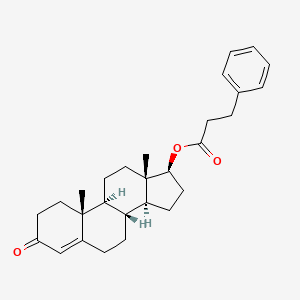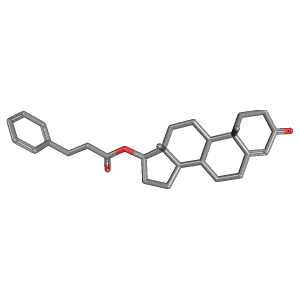Testosterone Phenylpropionate Information
Click here to view all Testosterone Phenylpropionate productsThe information, including but not limited to, text, graphics, images and other material contained on this website are for informational purposes only. No material on this site is intended to be a substitute for the consultation, diagnosis, and/or medical treatment of a qualified physician or healthcare provider.


Testosterone Phenylpropionate is an esterified form of testosterone, belonging to the class of anabolic androgenic steroids (AAS). It is a relatively fast-acting ester of testosterone that is designed to provide sustained release of testosterone into the bloodstream after injection. Here are some details about Testosterone Phenylpropionate:
- Testosterone Base: Testosterone is the primary male sex hormone responsible for the development and maintenance of male sexual characteristics. It is also an important hormone for muscle growth, bone density, and overall well-being. Testosterone Phenylpropionate is derived from testosterone by attaching a phenylpropionate ester to it.
- Ester Length and Half-Life: Testosterone Phenylpropionate has a shorter ester chain compared to other testosterone esters like testosterone enanthate or testosterone cypionate. This shorter ester results in a relatively shorter half-life of approximately 4.5 days. As a result, more frequent injections are required compared to longer-acting esters.
- Anabolic and Androgenic Effects: Testosterone Phenylpropionate exhibits both anabolic (muscle-building) and androgenic (masculinizing) effects. It enhances protein synthesis, nitrogen retention, and red blood cell production, promoting muscle growth, strength, and endurance. It also contributes to increased bone density and stimulates the development of secondary sexual characteristics in males.
- Performance Enhancement and Medical Use: Testosterone Phenylpropionate is primarily used in the medical field for testosterone replacement therapy (TRT) to treat conditions associated with low testosterone levels. It is also used off-label for performance enhancement by athletes and bodybuilders to increase muscle mass, strength, and athletic performance.
- Dosage and Administration: Testosterone Phenylpropionate is typically administered via intramuscular injection. The dosage and frequency of administration may vary depending on individual needs, goals, and medical advice. In the medical setting, dosages are usually lower and administered less frequently than in performance enhancement scenarios.
- Potential Side Effects: Like other testosterone-based compounds, Testosterone Phenylpropionate carries the risk of potential side effects. These can include estrogenic side effects such as water retention, gynecomastia (development of breast tissue in males), and increased blood pressure. Androgenic side effects may include acne, oily skin, increased facial and body hair growth, and potential male pattern baldness in individuals predisposed to it. It can also suppress natural testosterone production and may cause changes in cholesterol levels. Other possible side effects include mood swings, aggression, and cardiovascular strain.
It's important to note that the use of Testosterone Phenylpropionate or any other testosterone-based compound should only be undertaken under the guidance of a qualified healthcare professional. Misuse or abuse of testosterone can lead to serious health risks.
How Testosterone Phenylpropionate works?
Testosterone Phenylpropionate works by mimicking the actions of endogenous testosterone, the primary male sex hormone, in the body. Here's how it works:
- Binding to Androgen Receptors: Testosterone Phenylpropionate binds to androgen receptors found in various tissues throughout the body. When bound to these receptors, it activates specific cellular pathways, leading to various physiological effects.
- Stimulation of Protein Synthesis: Testosterone Phenylpropionate enhances protein synthesis in muscle cells. This means it increases the rate at which cells build new proteins, leading to muscle tissue growth, repair, and recovery. Elevated protein synthesis promotes an anabolic environment and helps athletes and bodybuilders increase muscle mass and strength.
- Nitrogen Retention: Testosterone Phenylpropionate improves nitrogen retention in muscle tissues. Nitrogen is a vital component of amino acids, which are the building blocks of proteins. By increasing nitrogen retention, Testosterone Phenylpropionate helps preserve muscle tissue and prevents muscle breakdown (catabolism). This results in a positive nitrogen balance, where the amount of nitrogen retained in the muscles exceeds the amount excreted.
- Enhanced Red Blood Cell Production: Testosterone Phenylpropionate stimulates the production of red blood cells (erythropoiesis). Red blood cells are responsible for carrying oxygen throughout the body. With increased red blood cell production, oxygen delivery to the muscles improves, enhancing endurance, stamina, and overall performance.
- Androgenic Effects: Testosterone Phenylpropionate exhibits androgenic effects, which are responsible for the masculinizing characteristics seen in males. These effects include the development of secondary sexual characteristics such as facial and body hair growth, deepening of the voice, and increased libido.
- Feedback Mechanism: Exogenous administration of testosterone, including Testosterone Phenylpropionate, can lead to feedback mechanisms that suppress natural testosterone production in the body. This occurs due to the negative feedback loop in the hypothalamic-pituitary-gonadal axis, where high levels of testosterone signal the body to reduce endogenous testosterone production. Consequently, when using Testosterone Phenylpropionate, there may be a temporary suppression of the body's own testosterone production, which can be managed through post-cycle therapy (PCT) protocols.
Overall, Testosterone Phenylpropionate works by enhancing protein synthesis, nitrogen retention, red blood cell production, and exerting androgenic effects. These mechanisms contribute to increased muscle mass, strength, endurance, and the development of secondary sexual characteristics. It's important to note that the use of Testosterone Phenylpropionate or any other testosterone-based compound should only be undertaken under the guidance of a qualified healthcare professional, as misuse or abuse can lead to serious health risks.
Synonyms of Testosterone Phenylpropionate
- Testosterone phenylpropionate
- 1255-49-8
- Retandrol
- Testosterone 17-phenylpropionate
- Testosterone hydrocinnamate
- Testosterone phenpropionate
- Testosterone, hydrocinnamate
- Testolent
- [(8R,9S,10R,13S,14S,17S)-10,13-dimethyl-3-oxo-1,2,6,7,8,9,11,12,14,15,16,17-dodecahydrocyclopenta[a]phenanthren-17-yl] 3-phenylpropanoate
- EINECS 215-014-4
- NSC 26643
- Androst-4-en-3-one, 17-(1-oxo-3-phenylpropoxy)-, (17beta)-
- UNII-8GN84GWX51
- 17beta-Hydroxyandrost-4-en-3-one 3-phenylpropionate
- 8GN84GWX51
- DTXSID5048712
- CHEBI:35002
- NSC-26643
- (8R,9S,10R,13S,14S,17S)-10,13-dimethyl-3-oxo-2,3,6,7,8,9,10,11,12,13,14,15,16,17-tetradecahydro-1H-cyclopenta[a]phenanthren-17-yl 3-phenylpropanoate
- Androst-4-en-3-one, 17-(1-oxo-3-phenylpropoxy)-, (17-beta)-
- C28H36O3
- Androst-4-en-3-one, 17-(1-oxo-3-phenylpropoxy)-, (17.beta.)-
- NCGC00160504-01
- Testanon 50 (TN)
- Testosteron phenylpropionate
- SCHEMBL940358
- GTPL7628
- CHEMBL2356993
- DTXCID8028638
- Testosterone 17beta-phenpropionate
- NSC26643
- Tox21_113116
- MFCD00056484
- TESTOSTERONE PHENYL PROPIONATE
- AKOS015895428
- AM84364
- DS-5641
- FD12013
- AC-28714
- CAS-1255-49-8
- LS-148821
- TESTOSTERONE PHENYLPROPIONATE [MART.]
- TESTOSTERONE PHENYLPROPIONATE [WHO-DD]
- 3-Oxoandrost-4-en-17-yl 3-phenylpropanoate #
- D08574
- 4-Androsten-17beta-ol-3-one 17-phenylpropionate
- A805391
- W-108401
- Q27088964
- Testosterone 17-phenylpropionate, analytical standard
- 3-OXOANDROST-4-EN-17.BETA.-YL 3-PHENYLPROPIONATE
- 17.BETA.-HYDROXYANDROST-4-EN-3-ONE 3-PHENYLPROPIONATE
- Androst-4-en-3-ona, 17-(1-oxo-3-fenilpropoxi)-, (17?)-
- Androst-4-en-3-one, 17-(1-oxo-3-phenylpropoxy)-, (17?)-

